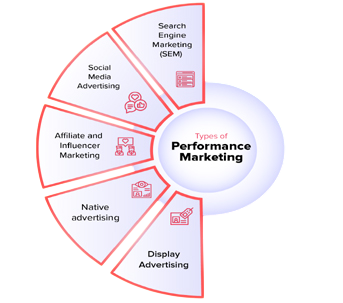


Performance Marketing is a digital marketing strategy focused on driving measurable results and outcomes, where advertisers pay based on the performance of their campaigns. Unlike traditional marketing, where businesses pay upfront for ads, performance marketing is outcome-based, meaning advertisers only pay for specific actions such as clicks, conversions, leads, or sales. This model ensures that marketing budgets are allocated efficiently, as the focus is on achieving quantifiable results. Common channels for performance marketing include search engine marketing (SEM), affiliate marketing, social media ads, and display advertising.
One of its key advantages is the ability to track and analyze data in real-time, allowing businesses to optimize campaigns continuously. Performance marketing helps businesses lower their risk by linking costs directly to the achievement of set goals, making it a highly effective and ROI-driven approach.
Performance Marketing is a results-driven approach that enables businesses to optimize their marketing efforts by focusing on specific, measurable goals. Advertisers only pay when a predefined action is completed, such as a click, lead, sale, or any other desired outcome. This pay-for-performance model ensures that marketing budgets are spent efficiently, as advertisers are only charged when actual value is delivered. With platforms like Google Ads, Facebook Ads, and affiliate marketing, businesses can track performance in real time, allowing them to tweak campaigns for maximum effectiveness.
One of the key benefits of performance marketing is its transparency and accountability. Advertisers have direct access to performance data, which provides insights into how well campaigns are performing and where improvements can be made.

Common channels in performance marketing include search engine marketing (SEM), social media advertising (such as Facebook Ads and Instagram Ads), affiliate marketing, display advertising, and email marketing. These channels allow businesses to target specific audiences and track the performance of their campaigns.
CPC (Cost-Per-Click) refers to paying for each click on an ad, while CPA (Cost-Per-Acquisition) means paying only when a specific action is completed, such as a sale, lead, or download. CPC is focused on driving traffic, while CPA is focused on achieving actual conversions, making CPA more closely tied to performance outcomes.
ROI (Return on Investment) in performance marketing is measured by comparing the revenue generated from a campaign to the cost spent on that campaign. A positive ROI means that the revenue generated exceeds the marketing costs, making the campaign profitable. Tools like Google Analytics and platform-specific dashboards help track and calculate ROI in real-time.
The main benefits of performance marketing include cost efficiency, as businesses only pay for actual results. It also provides transparency, real-time tracking, and measurable outcomes, allowing marketers to optimize campaigns continuously. Performance marketing ensures better control over budget allocation, higher ROI, and the ability to scale successful campaigns rapidly.
Our team will answer all your questions. we ensure a quick response.
Elevate your hotel's success with a comprehensive audit, identifying areas for improvement and enhancing overall guest experience. Maximize efficiency, profitability, and operational excellence for a seamless stay. Boost guest satisfaction and drive sustainable growth with actionable insights.
Terms & Conditions | Cancellation Policy | Refund Policy | Shipping Policy | Data Delete Request | Privacy Policy
Copyright © 2025 All Rights Reserved. By Revup